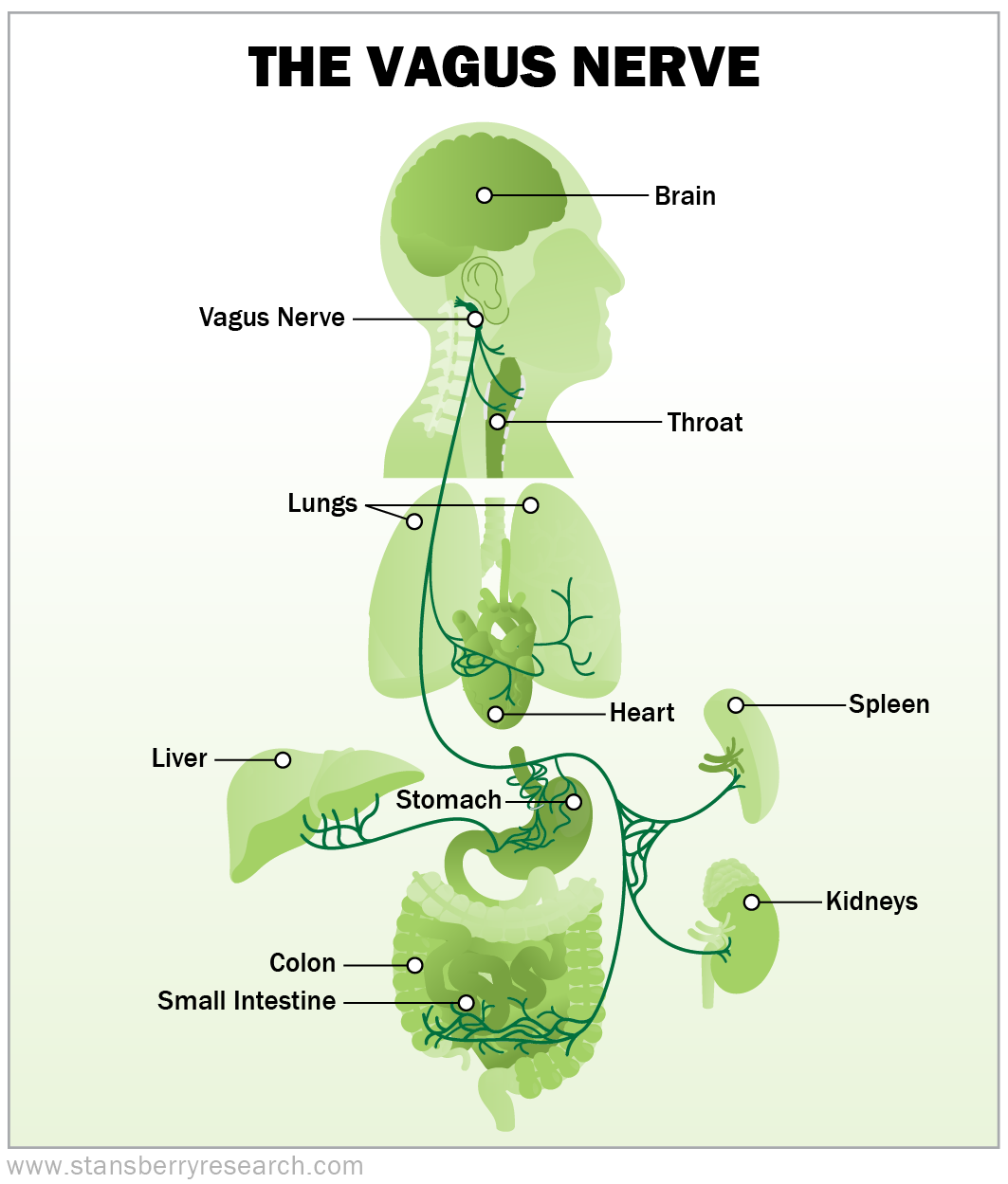In medical school, I spent a lot of time memorizing just about everything...
A classic way to do this was through mnemonics, which is a way to remember things using associations. One of my favorites in school was "Point and Shoot." The P was for para, and the S was for sympathetic. This meant that the parasympathetic nervous system needed to be active in order for men to get erections.
And it turns out that a critical connection to that system exists in a pair of nerves in your body that operate like a superhighway of communication, a pair you've probably never heard of...
This nerve pair is so influential that after today you'll be wondering why people don't talk about it as much as they talk about our brains.
If you've ever experienced heartburn or irritable bowel syndrome, guess what... this nerve is involved.
If you've had high blood pressure, heart disease, chronic inflammation, or are overweight, guess what... this nerve is involved.
If you've ever experienced anxiety or depression... yep, this nerve is involved.
It's called the vagus nerve. It is one of your 12 cranial nerves (number 10) and is in your brain stem at the base of your skull. You have one on the left side of your body and one on the right.
And I've got some great news for you... mastering the nerve's activity can make life better (even your sex life).
Turns out, there are a myriad of activities that you can do to help your vagus nerve function better. I'll cover those later, but first... here's a bit more background information on the vagus nerve...
The Vagus Nerve
The vagus nerve is a main component of the section of the nervous system that makes digestion happen – called the enteric nervous system (or the ENS).

The vagus nerve has three primary roles:
- It communicates with the brain.
- It sends messages from the brain to other organs in the body.
- It sends messages from the organs in the body to the brain.
In 1994, Stephen Porges, PhD, developed the polyvagal theory, which is all about our perception of safety, how that perception will impact our ability to function socially, and how the vagus nerve is a central component of our experiences. The theory describes the three ways that the vagus nerve causes the body to respond to both perceived external and internal threats...
If we consider the environment to be safe, we will exist in a "rest and digest" state where we are free to express our feelings, our faces, and engage socially. In this state, our heart and our breathing rates are calm. This reaction stems from the part of the vagus nerve that faces the front of your body, known as the ventral vagus. This is a state in which the parasympathetic system is working.
If we consider the environment to be unsafe, our bodies will kick into "fight or flight" survival mode. Our attention is focused on getting away from the threat, and our heart and breathing rates will quicken. This reaction stems from our sympathetic nervous system, which is responsible for all of our fight-or-flight reflexes.
If our fight-or-flight efforts aren't effective in making us feel safe and the threat becomes overwhelming, our systems will "freeze or shut down." In this state, we have lost the capacity to function socially or relate to the world around us. This reaction stems from the part of the vagus nerve that faces the back of your body, known as the dorsal vagus.
The polyvagal theory helps to explain why some people can become isolated as the result of prolonged pain or dysfunction. It also helps solidify our understanding of how our emotional states are very closely tied to what's happening inside our bodies...
The vagus nerve plays a role in so many aspects of our lives that everyone can benefit from improving its function.
Improving Your Vagus Tone
Improving the efficiency and function of your vagus nerve is referred to as your vagal tone. If your vagal tone is high, your nerve is doing its job well. However, if your vagal tone is low, you may be experiencing some problems.
When you have high – or good – vagal tone, your heart rate will increase slightly when you inhale and decrease slightly when you exhale. This measure is called resting heart rate variability ("HRV").
Some things that can go wrong when you have low vagal tone or damage to your vagus nerve include:
- Inflammation and inflammatory conditions (like heart disease, diabetes, cancer, arthritis, irritable bowel syndrome, and more)
- Depression
- Anxiety
- Bad moods
- Feeling lonely
- Stroke
- High blood pressure
- Irregular blood-sugar levels
- Chronic fatigue
- Autoimmune disorders
- Celiac disease and gluten sensitivity
- Fainting
- Epilepsy
- Psychiatric conditions that don't respond to medication
- Nausea
- Bloating
- Gastroparesis (when the stomach empties too slowly)
You get the idea. And it makes sense because the vagus nerve comes in direct contact with so many of the body's vital organs, as you saw in the image above.
Basically, if you want to keep your body and organs running smoothly, you need to take care of your vagus nerve. But it's something I doubt most folks have even heard of.
Keep an eye on your inbox because on Thursday, I'll share six activities you can start doing today to increase your vagal tone...
What We're Interneting...
- Something different: All coral cells grown in a dish for the first time.
Here's to our health, wealth, and a great retirement,
Dr. David Eifrig and the Health & Wealth Bulletin Research Team
July 13, 2021
